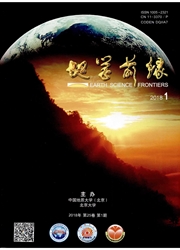

 中文摘要:
中文摘要:
岩溶生态系统是受岩溶环境制约的生态系统,中国西南7省1市岩溶环境中存在石漠化趋势。植被的恢复和生态重建具有非常重要的意义。土壤微生物和植物的碳酸酐酶(carbonic anhydrase,简称CA)在生物岩溶作用中扮演重要角色,对岩溶生态系统的良性演化具有重要作用。从元素迁移的生物地球化学特性和植物、微生物的碳酸酐酶等生理生化指标出发,考察西南岩溶环境中典型植物可能的适应机制,即植物适应偏碱性逆境、高钙逆境、土壤贫瘠逆境、干旱逆境的机制。根据典型植物在西南岩溶环境中的适应机制和植被演替规律,从改善立地奈件入手,先草后灌木、乔木来进行石漠化治理。与非岩溶区植物相比,西南岩溶区植物的铝含量较低,重金属(如铅、汞)的含量较低,是一种较优良的绿色植物。由于岩溶区土壤含水量较低等原因导致植物脯氨酸含量的显著增加,脯氨酸具有抗氧化活性,螯合金属离子减少其毒性等特性,可以开发富舍脯氨酸的特种食品。这表明在岩溶环境中经济植物的地域性开发意义重大。
 英文摘要:
英文摘要:
Karst ecosystems are controlled by karst environments. Rocky desertification occurs in karst areas in seven provinces and one city of southwest China. It is of great significance to recover the vegetation and restore damaged ecosystems. The carbonic anhydrase of soil microbes and plants plays an important role in bio-karst, and is very important in the benign evolution of karst ecosystem. Based on the bio-geochemical characteristics of element migration and the physiology and biochemistry of soil microbes and plants, we have investigated the adaptive mechanisms of representative plants in southwest China's karst areas. We have studied the adaptive mechanisms of representative plants for adapting to alkali environment, to high concentrations of calcium, to lean soil, and to drought. According to the adaptive mechanisms of representative plants in the karst areas and the rule of successive alternations of vegetations, we started with the improvement of the natural conditions for plant standing fast; grass, shrubs and trees were planted sequentially to subdue the rocky desertification in karst areas. The properties of plants in karst and non-karst areas are different. Compared with the plants in non-karst areas, the aluminum contents of plants in karst areas are lower, and other heavy metals, for example Pb and Hg, are also lower; thus, the plants in karst areas are good green plants. Moreover, proline accumulation in plants appears to be an additional defense against water stress in karst area. Proline is an antioxidant and can chelate metal ions to reduce the toxicity of metal ions; thus, it is possible to develop special kinds of food with high contents of proline in karst areas. All above suggests that it is of great significance to grow adaptive economic plants in karst areas.
 同期刊论文项目
同期刊论文项目
 同项目期刊论文
同项目期刊论文
 期刊信息
期刊信息
